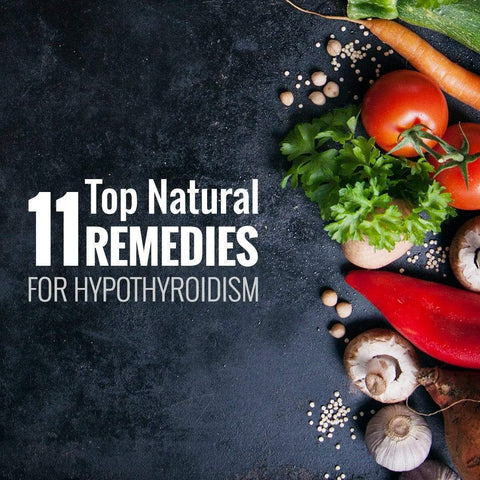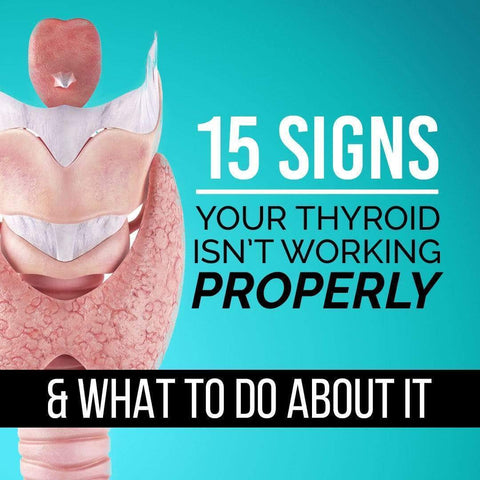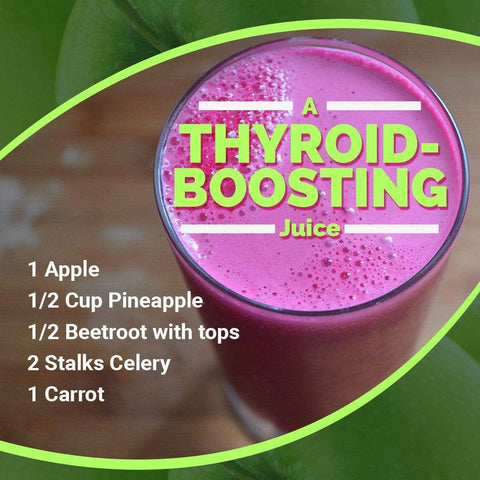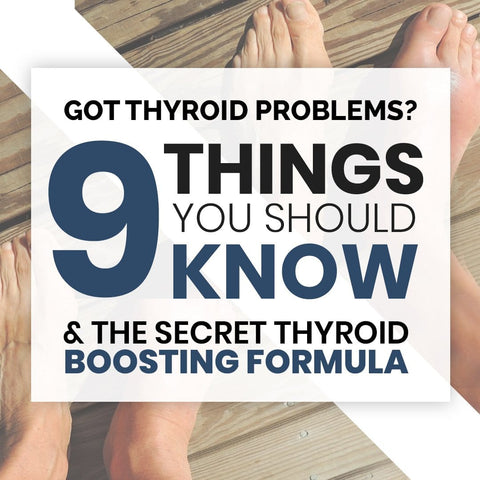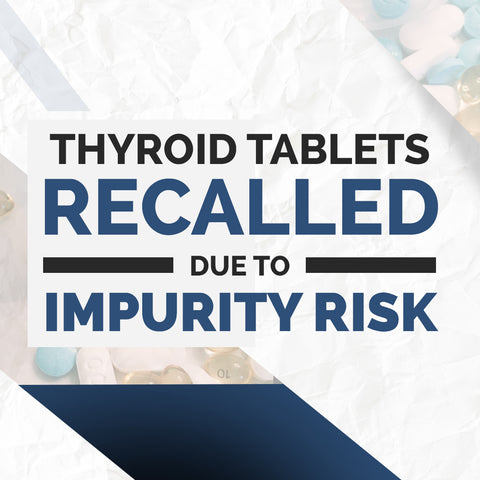
The thyroid is a small endocrine (hormone-producing) gland that has profound effects on the physiology of your whole body.
This gland sits below your Adam’s apple in your neck and plays a crucial role in controlling the metabolism of your cells, or the rate at which your cells perform their duties.
This organ interacts with cells in the body through the hormones it produces, and if it's not producing enough, you will feel weak, cold, and not very well.
Thyroid hormone affects many things in the body like protein synthesis, fat breakdown, heart function, and neurotransmitter synthesis.
Hypothyroidism: Too Little Thyroid
When the thyroid is not producing enough hormones, this dysfunction is referred to as hypothyroidism. Many people experience this condition and much of the time it is caused by the following.
- Deficiency in certain thyroid-sustaining nutrients
- Autoimmune disease
- Dysfunction of the pituitary gland in the brain
The thyroid controls how fast your body turns the food you consume and the oxygen you breathe into energy. Underactive thyroid function (hypothyroidism) is a common problem and can make people feel a number of symptoms and signs.
8 Signs of an Underactive Thyroid
1. Consistent fatigue
Thyroid hormones determine the metabolic rate of your cells. The hormones T3 and T4 (but mostly T3 because it’s the most active form) are needed to make your cells perform their duties at a quick, healthy, and youthful rate.
So if your thyroid isn’t producing enough hormones, your cells will function slowly because they can’t turn food into energy fast enough, and you’ll feel tired much of the time.
2. Weight gain
Many people have trouble losing weight and stack on the pounds because of the low metabolism fostered by hypothyroidism.
Exclusive Bonus! Download the FREE report ‘10 Top Foods To Boost Your Thyroid’ by clicking here.
3. Mental fogginess, lack of mental clarity
Feel like your mind is working slowly? Or you can’t think as clearly as you’d like? There are perhaps two reasons why sluggish thyroid function causes mental fogginess. One is that as your cells work slower, all processes slow down, including neurological functions.
Another reason is that you might not be producing enough neurotransmitters to properly run your brain function. For instance, the stimulatory neurotransmitters that play big roles in cognition, like norepinephrine and dopamine might be low, without thyroid function.

4. Depression
In the much the same way as your mental clarity is affected, your neurotransmitter levels might be low if your thyroid is sluggish. The thyroid is involved in the synthesis of the monoamine neurotransmitters that make you feel good and cognitively function well.
Low serotonin could make you feel anxious and uneasy; low dopamine could make you feel less motivation and less pleasure; and low norepinephrine could make you less aware and less stimulated.
5. A general decline in quality of life
Put simply, you just won’t feel as good as you’re supposed to when your thyroid isn’t putting out the hormones your body needs.
Many middle-aged and elderly people are told that their lack of energy and litany of general symptoms are just signs of getting old. But practitioners often find that low thyroid performance plays a big role in these symptoms. When the thyroid performs better or hormones are replaced, patients notice obvious improvements in the way they feel.
6. Cold sensitivity
Thyroid hormone is needed to make heat in your body. With low levels, you might notice your extremities (hands and feet) get cold easily. You might also be extra sensitive to cold temperatures, such as cold air or water.
7. Dry skin

Hormones control the functions of the body, sending signals to cells to perform certain tasks. And it turns out that the thyroid influences many functions of the skin. The thyroid can affect the rate of hair growth on the skin, the amount of moisturizing grease in sebum, and even the thickness of the skin.
So without enough thyroid hormone, you could have less attractive and dryer skin. Sebum is needed to moisturize the skin, and you want thyroid to help you keep a healthy skin because unhealthy skin results in wrinkles and sagginess.
8. Sexual dysfunction
If you have a lack of sexual desire, and/or erectile dysfunction, you could be hypothyroid. Lack of thyroid hormone is known to cause sexual dysfunction like low sex drive and delayed/ premature ejaculation in men.
Clearly, there are numerous ways in which you won’t feel good if your thyroid isn’t functioning as well as it should. The more of these symptoms you have, the higher your chance of hypothyroidism.
3 Remedies That Help Thyroid Function
1. Ingest the nutrients that your thyroid needs to flourish.
There are at least three micronutrients that are essential to the proper functioning of your thyroid. Without these nutrients, your thyroid can’t pump out the hormones that your cells need, and a deficiency of certain nutrients can even make your thyroid vulnerable to autoimmune attack.
Think of it as putting “gasoline” in the “tank” of your thyroid. Your thyroid, just like your car, can’t run right without the proper fuel.
Three main nutrients are required for the workings of your thyroid. And these nutrients can even play a role in protecting your thyroid against the improper attack on thyroid tissue of your body’s own immune system.
Here are three of the most important thyroid-supporting nutrients:
- Iodine
The thyroid produces T4 and T3 by combining the mineral iodine with the amino acid tyrosine.1 It is estimated that about 2 billion people, or 30% of the world’s population, might still be deficient in iodine.2

- Selenium
Selenium is essential for the proper production of T3, the most active form of thyroid hormone. This mineral converts the less active thyroid hormone T4 into T3, as the enzyme that makes this conversion is selenium-dependent.3
In several studies, selenium appears to play a role in protecting the thyroid gland from autoimmune attacks by the body’s own immune system.10 Part of the reason for this is that the thyroid needs selenium to make the powerful glutathione antioxidant which protects the tissue. In people who have an autoimmune issue, blood tests have confirmed that thyroid autoantibodies (measures of autoimmune activity) decreased by 40% after selenium supplementation.4

- Zinc
Zinc is needed for thyroid hormone synthesis and has been correlated with hypothyroidism. When zinc levels are low, levels of thyroid hormones are also low.5
2. Eat foods that boost thyroid function.
Diet can be used to address thyroid functioning. Due to the nutritional composition of certain foods, they can be used to nourish, protect, and invigorate the thyroid.
Foods high in Iodine, Zinc and Selenium are all good options. Click here to download the top 10 foods for thyroid health.
3. Detoxify by sweating
Environmental pollutants such as heavy metals can inhibit thyroid hormone production, interrupt thyroid hormone movement throughout your body, and might increase autoimmune attacks on the thyroid.
Environmental pollutants such as heavy metals can inhibit thyroid hormone production, interrupt thyroid hormone movement throughout your body, and might increase autoimmune attacks on the thyroid.6, 7
It has been evidenced that toxins like mercury cause hyperreactivity in T cells (a type of immune cell).6 This hyperreactivity can cause immune cells to be overly aggressive and possibly attack your own tissue instead of foreign pathogens in the body. Pollutants can indeed reduce “self tolerance” or the immune system’s ability to not attack its own tissue.8
Sweating through exercise, or sweat therapy like saunas or steam baths, is one of the few proven ways of eliminating environmental pollutants from the body.9, 10 And you might consider eating more organic certified foods since they have far less synthetic chemicals on them.
So do your body and thyroid a favor by sweating a few times a week!
Natural Ways To Support Normal Thyroid Function
Did you know that you can naturally support your thyroid function with certain foods and remedies without the harsh effects of prescription drugs?
It’s true - and we’d love to share them with you!
Evan Burns, lead nutritionist and researcher at Nutracraft, shows you exactly what foods and natural remedies work to naturally maintain normal thyroid balance and function.





